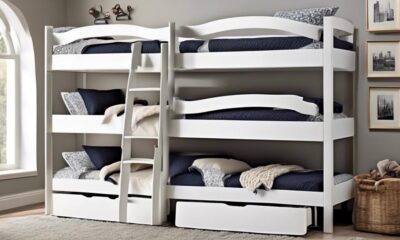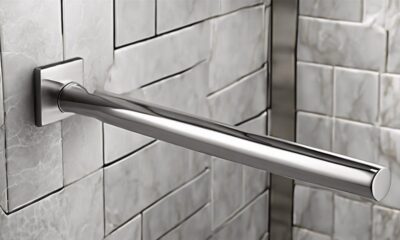Appliances
Different Light Bulb Bases
2025
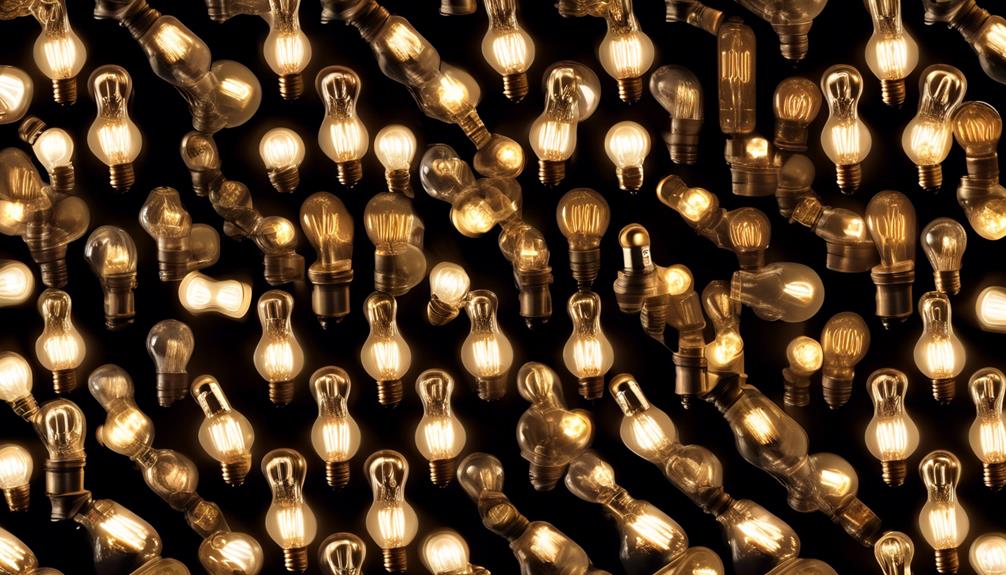
Have you ever thought about the different types of light bulb bases that are currently on the market? From the traditional screw-in (Edison) base to the bi-pin, twist-lock, and candelabra bases, it seems like there is a base for every kind of fixture.
But why are there so many different bases, and how do you know which one to choose for your specific lighting needs? Understanding the differences between these bases can not only help you find the right bulb for your fixture but also ensure you achieve the perfect lighting ambiance in your space.
Key Takeaways
- Screw-in (Edison) Base is energy efficient, versatile, and supports various bulb types.
- Bayonet Base offers secure and quick installation, commonly used in automotive lighting.
- Twist-lock Base provides a reliable and stable connection, commonly used in modern fixtures.
- Bi-pin Base is versatile and commonly found in fluorescent tubes and some LED bulbs.
- GU24 Base is an efficient alternative, compatible with CFLs and LED bulbs, and eliminates the need for mercury.
- Candelabra Base accommodates smaller bulbs, provides an elegant touch to decorative fixtures.
- Medium (E26/E27) Base has slight differences in threading and voltage compatibility between E26 and E27.
- Miniature (E10/E11) Base is available in two sizes with different wattage limits, handle with care due to small size.
- Intermediate (E17) Base is versatile for outdoor lighting and accommodates larger bulbs for brighter illumination.
- Candelabra (E12) Base is compact yet powerful, suitable for chandeliers and decorative fixtures.
- Wedge Base is a sleek alternative commonly used in landscape and automotive lighting.
Screw-in (Edison) Base
What makes the screw-in (Edison) base unique and versatile in the world of lighting fixtures?
The screw-in (Edison) base is a cornerstone of lighting technology, known for its energy efficiency, durability, and adaptability. This base type accommodates a wide range of bulbs, from compact fluorescent to LED, offering consumers flexibility in choosing the right bulb for their needs. Its durability ensures a secure fit, reducing the risk of damage during installation and use. Additionally, the screw-in base supports bulbs with varying color temperatures, allowing users to create different atmospheres within their spaces. Its dimmability feature further enhances its versatility, providing control over the ambiance and energy consumption.
The engineering behind the screw-in base showcases innovation and precision, catering to the demands of a technologically advanced market. This base has revolutionized the lighting industry, providing consumers with a reliable and adaptable solution for their lighting needs. With its combination of energy efficiency, durability, color temperature options, and dimmability, the screw-in (Edison) base stands as a testament to the mastery of lighting technology.
Bayonet Base
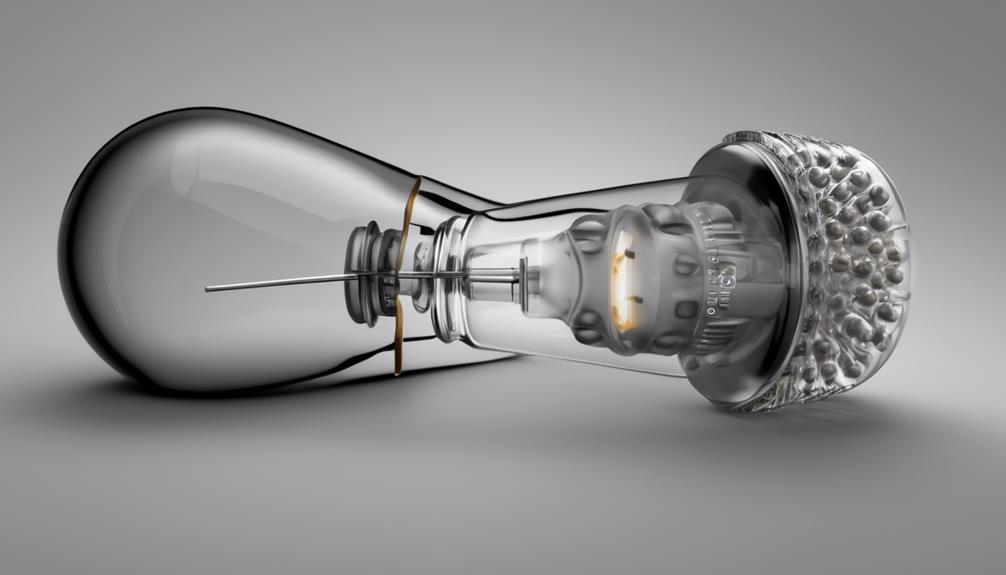
Alright, let's talk about the Bayonet Base.
This type of base features two or more pins that fit into corresponding slots on the socket.
The bayonet base is commonly used in automotive lighting and certain types of household fixtures.
Bayonet Base Features
The Bayonet Base features a unique design that allows the bulb to be securely and quickly installed with a simple twist. Its advantages include easy installation, a secure connection, and resistance to loosening due to vibrations.
However, it may be challenging to find a wide variety of bulb options compared to other bases. Retrofitting bayonet base fixtures can be achieved by using adapters for converting to other base types, or by replacing the socket entirely with a new one that accommodates a different base.
When retrofitting, it's essential to ensure compatibility with the fixture and to consider any potential changes in the bulb's positioning or appearance. Understanding these features is crucial for mastering the use of bayonet base fixtures and making informed decisions when selecting and installing light bulbs.
Bayonet Base Applications
Bayonet base applications encompass a diverse range of lighting fixtures and are known for their reliable and secure installation method. The bayonet base is commonly found in vintage lighting, where its sturdy and twist-lock design provides a classic touch to antique lamps and chandeliers. This traditional connection method ensures a stable and durable fit, making it ideal for historical and period lighting pieces. In addition, the bayonet base is widely used in automotive applications, particularly in older vehicles. Its secure and vibration-resistant nature makes it an excellent choice for automotive lighting, providing a dependable connection that can withstand the rigors of driving. Whether in vintage lighting or automotive use, the bayonet base continues to demonstrate its versatility and reliability.
| Bayonet Base Applications | Examples |
|---|---|
| Vintage Lighting | Antique lamps, chandeliers |
| Automotive | Older vehicle lighting |
Bi-pin Base
With the bi-pin base, we can easily and securely connect our light bulbs to the fixture. This type of base is commonly found in fluorescent tubes and some LED light bulbs.
Here are three important aspects to consider when dealing with bi-pin bases:
- Electrical connections: Bi-pin bases are designed to provide a reliable electrical connection between the light bulb and the fixture. The pins are positioned to ensure proper contact, allowing electricity to flow consistently and power the light source.
- Pin spacing: One critical characteristic of bi-pin bases is the distance between the pins. The standard spacing for bi-pin bases is crucial for ensuring compatibility with the corresponding sockets in the fixture. This uniformity allows for easy installation and replacement of bulbs.
- Versatility: Bi-pin bases are widely used in various lighting applications, from residential settings to commercial and industrial environments. Their versatility makes them suitable for different types of fixtures and lighting configurations, providing a convenient and efficient solution for diverse lighting needs.
Understanding the electrical connections, pin spacing, and versatility of bi-pin bases is essential for mastering the installation and maintenance of light fixtures utilizing this type of base.
Twist-lock Base

Let's talk about the twist-lock base, a unique and secure way to connect light bulbs to fixtures.
We'll cover an overview of the twist-lock base, explore the types of light fixtures it's compatible with, and provide guidance on its installation and removal.
This innovative base design offers a reliable and efficient way to keep light bulbs securely in place, ensuring optimal performance and safety.
Twist-Lock Base Overview
Twist-lock bases are commonly used in modern lighting fixtures due to their secure and reliable connection mechanism. These bases provide several benefits, including:
- Secure Connection: The twist-lock design ensures a snug and stable connection, reducing the risk of flickering or loose connections commonly associated with other base types.
- Versatility: Twist-lock bases are available in various sizes, making them compatible with a wide range of lighting fixtures, from ceiling lights to outdoor floodlights.
- Safety: The twist-lock mechanism offers an added layer of safety by minimizing the chances of accidental disconnection, especially in high-vibration environments or areas with frequent power fluctuations.
When comparing twist-lock bases to other types, their robust and dependable nature makes them a preferred choice for many lighting applications.
Compatible Light Fixtures
When installing lighting fixtures with twist-lock bases, it's essential to ensure compatibility for seamless integration within your space. Ensuring bulb compatibility and proper fixture selection is crucial to achieving optimal lighting performance. Here's a guide to help you select the right fixtures for twist-lock base bulbs:
| Fixture Type | Description |
|---|---|
| Recessed Lighting | Ideal for ambient and task lighting, compatible with twist-lock base bulbs for energy-efficient illumination. |
| Track Lighting | Offers versatility for directing light where needed, compatible with twist-lock base bulbs for adjustable lighting solutions. |
| Pendant Lighting | Adds a decorative element to the space, compatible with twist-lock base bulbs for stylish and functional illumination. |
Installation and Removal
To securely install or remove a twist-lock base bulb, align the tabs on the bulb with the notches in the socket and gently twist clockwise until it locks into place or counterclockwise to remove it.
When installing or removing twist-lock base bulbs, follow these installation tips for a smooth process:
- Safety Precautions: Always turn off the power before installing or removing the bulb to avoid electrical shock.
- Troubleshooting Techniques: If the bulb isn't locking into place, ensure that the tabs on the bulb align properly with the notches in the socket. If the bulb is difficult to remove, gently wiggle it while twisting counterclockwise.
- Energy Efficiency: To maximize energy efficiency, choose LED twist-lock base bulbs, which consume less energy and have a longer lifespan compared to traditional incandescent bulbs.
GU24 Base

The GU24 base is a unique and efficient alternative to traditional screw-in light bulb bases, offering a secure twist-and-lock mechanism for easy installation and removal of the bulb.
When it comes to energy efficiency, the GU24 base is a standout performer. Its design minimizes energy loss through heat, making it an environmentally responsible choice. This base is compatible with compact fluorescent lamps (CFLs) and LED bulbs, both of which are renowned for their low energy consumption and long lifespan.
By using the GU24 base, consumers can significantly reduce their energy consumption and carbon footprint while enjoying high-quality lighting. Its environmental impact is further enhanced by the reduction of hazardous materials, as the base design eliminates the need for mercury, a common component in traditional incandescent bulbs.
The twist-and-lock mechanism not only ensures a secure fit but also simplifies the installation process, making it a user-friendly option for both residential and commercial settings.
With its focus on energy efficiency and minimal environmental impact, the GU24 base represents a forward-thinking approach to lighting technology.
Medium (E26/E27) Base
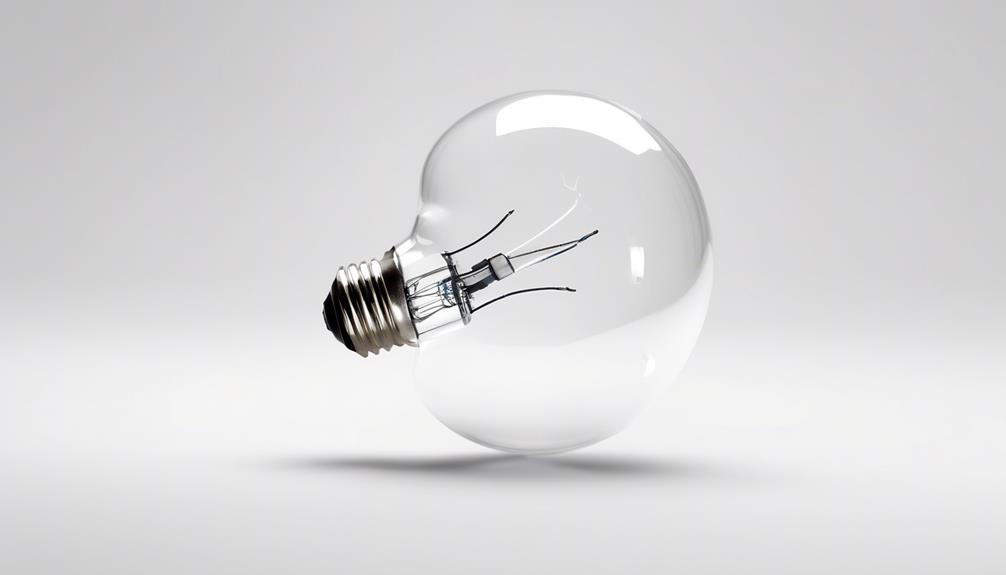
Let's unravel the differences between E26 and E27 bases. Their compatibility with various fixtures and the wattage limits associated with each are important factors to consider. Understanding the nuances of these medium bases can greatly impact the performance and longevity of your light bulbs.
It's time to shed light on the technical aspects of these common bulb bases.
E26 Vs E27
Comparing the E26 and E27 medium bases reveals subtle differences that can impact the compatibility of light bulbs with fixtures.
Both E26 and E27 bases are widely used, but understanding their disparities is crucial for selecting the right bulb.
- Voltage Differences: E26 bases are typically designed for use with 120-volt systems, while E27 bases are commonly used with 220-240-volt systems. This difference is important to consider when selecting light bulbs for specific electrical setups.
- Socket Types: E26 and E27 bases have slightly different threadings, with E26 having 26.05 mm diameter and E27 having 26.45 mm. While this variance may seem small, it can affect the fit of the bulb within the fixture.
- International Standards: E26 is the standard size in the Americas and E27 is the standard in Europe. Understanding these international standards is essential when purchasing bulbs for use in different regions.
Understanding these nuances is essential for ensuring proper bulb fitting and electrical compatibility.
Compatibility
When considering the compatibility of medium (E26/E27) bases, it's crucial to understand the subtle differences that can impact the fit and electrical performance of light bulbs within fixtures.
Retrofit options are available to ensure that E26 and E27 bases can be used interchangeably, but it's important to note that E27 bases are slightly larger and may not fit into fixtures designed specifically for E26 bases.
When retrofitting, it's essential to check that the new bulb won't only physically fit but also maintain the same electrical specifications as the original.
Additionally, energy efficiency considerations come into play when choosing between E26 and E27 bases, as different bulb types can have varying energy efficiency.
Understanding the compatibility of medium bases is essential for ensuring the proper fit and electrical performance of light bulbs within fixtures.
Wattage Limits
Understanding the wattage limits for medium (E26/E27) bases is crucial for ensuring the safe and efficient operation of light bulbs within fixtures. Here are three key points to consider when it comes to wattage limitations:
- Understanding wattage limitations: Medium bases typically have a wattage limit of 60W for incandescent bulbs, but it's important to check the fixture's specifications for any specific restrictions. This ensures that the bulb doesn't generate excessive heat, which could lead to safety hazards.
- Choosing the right bulb for safety and efficiency: Opting for energy-efficient LED or CFL bulbs not only helps in reducing energy consumption but also provides a wider range of wattage options. This allows for flexibility in choosing the appropriate brightness level while staying within the wattage limits of the fixture.
- Verifying compatibility: Always verify the wattage limits and compatibility of the bulb with the fixture to avoid potential damage and ensure optimal performance.
Miniature (E10/E11) Base
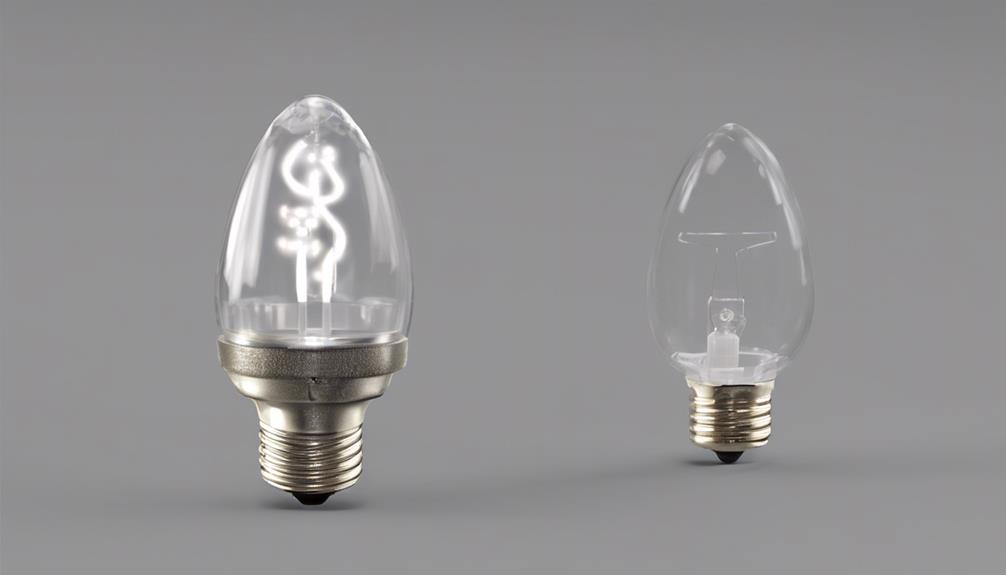
Illuminating small spaces with precision and efficiency, the Miniature (E10/E11) base is a compact and versatile option for various lighting applications.
When it comes to E11 vs E10 compatibility, it's essential to ensure that the bulb base matches the socket. The E11 base is slightly smaller than the E10, so it's crucial to check the socket size before purchasing bulbs.
Additionally, understanding wattage limits is vital for safe operation. For E10 bases, the wattage should typically not exceed 7-10W, while E11 bases can handle slightly higher wattages, usually in the range of 7-15W.
When installing bulbs with a Miniature base, it's important to handle them carefully due to their small size. Always turn off the power before installation, and avoid overtightening the bulb to prevent damage to the base or socket threads.
With these considerations in mind, the Miniature (E10/E11) base provides an excellent option for compact lighting needs, offering efficient illumination in a small and versatile package.
Intermediate (E17) Base

The efficiency and precision of the Miniature (E10/E11) base make way for a seamless pivot into the Intermediate (E17) base, which caters to larger lighting needs with its adaptable design and capabilities. The E17 base holds many advantages, including:
- Versatility: The E17 base is versatile and can be utilized in a variety of lighting fixtures, making it a convenient choice for different indoor and outdoor settings.
- Durability: With its sturdy design, the E17 base is well-suited for outdoor lighting applications. It can withstand exposure to the elements, making it a reliable option for illuminating outdoor spaces.
- Enhanced Illumination: The E17 base accommodates larger bulbs, allowing for increased wattage and brighter illumination. This makes it ideal for lighting up larger outdoor areas such as gardens, pathways, and outdoor seating areas.
In outdoor lighting, the E17 base proves to be a valuable asset due to its adaptability, durability, and capability to provide enhanced illumination. Whether used in decorative outdoor fixtures or functional security lighting, the E17 base offers a reliable and efficient solution for various outdoor lighting needs.
Candelabra (E12) Base

Nestled within the realm of light bulb bases, the Candelabra (E12) base emerges as a compact yet powerful option for a range of lighting fixtures. Despite its diminutive size, this base accommodates a variety of bulb options, from incandescent to LED and compact fluorescent bulbs. Its small size makes it ideal for chandeliers, wall sconces, and decorative fixtures, offering a stylish and functional lighting solution.
When considering bulb options for the Candelabra (E12) base, energy efficiency is a crucial factor. LED bulbs, in particular, are a popular choice due to their low energy consumption and long lifespan. This makes them an environmentally friendly and cost-effective option for candelabra fixtures. Additionally, safety is paramount when using these bulbs, as the compact size means heat output is concentrated. It's essential to select bulbs that emit minimal heat to prevent damage to the fixture and reduce the risk of overheating.
The Candelabra (E12) base may be small, but it packs a punch in terms of versatility, energy efficiency, and safety considerations. When choosing bulbs for this base, it's important to prioritize efficiency and heat output to ensure a long-lasting and secure lighting solution.
Wedge Base
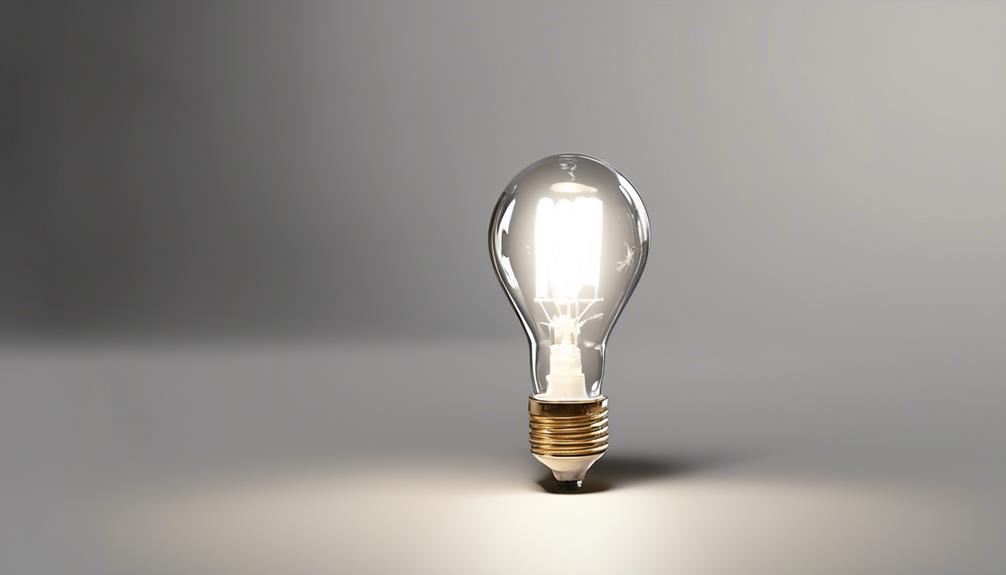
Emerging as a sleek and versatile alternative to the compact Candelabra (E12) base, the Wedge base offers a unique lighting solution for various fixtures. This base is particularly popular in landscape and automotive lighting due to its efficient design and easy installation process.
When considering the Wedge base, it's important to note the following:
- Installation Tips: When installing a wedge base bulb, it's crucial to handle the bulb carefully to avoid breakage. Additionally, ensure that the contacts align properly with the socket to prevent any potential connectivity issues.
- Compatibility Issues: While the wedge base is widely used, it's essential to verify the compatibility of the bulb with the fixture. Some fixtures may require a specific type of wedge base, so it's important to check the specifications before making a purchase.
- Advantages, Disadvantages: One advantage of the wedge base is its compact size, making it suitable for small fixtures. However, its small size can also be a disadvantage, as it may not be as secure or durable as larger bases in certain applications.
Understanding these installation tips and potential compatibility issues is crucial when working with wedge base bulbs, allowing for a seamless integration into various lighting fixtures.
Frequently Asked Questions
Can I Use a Screw-In (Edison) Base Light Bulb in a Fixture That Requires a Bayonet Base?
Yes, you can use a screw-in (Edison) base light bulb in a fixture that requires a bayonet base, but it requires a cross base adapter.
This ensures socket compatibility and maintains electrical compatibility between the different base types.
What Is the Difference Between a Medium (E26/E27) Base and a Candelabra (E12) Base?
We can differentiate E26 and E12 bases by their size and compatibility.
E26 bases, also known as medium bases, are larger and used for general lighting applications.
E12 bases, or candelabra bases, are smaller and often used for decorative lighting.
When considering compatibility, it's important to note that E26 and E12 bases aren't interchangeable.
Using a screw-in base in a fixture that requires a bayonet base can lead to electrical and mechanical issues.
Are Twist-Lock Base Bulbs Compatible With All Twist-Lock Sockets, or Are There Different Types of Twist-Lock Bases?
Twist-lock base bulbs are compatible with twist-lock sockets, but there are different types of twist-lock bases.
It's crucial to ensure the bulb matches the socket, as variations exist.
When selecting twist-lock base bulbs, consider options like CFL, LED, or halogen for energy efficiency.
During installation, align the tabs on the bulb base with the notches in the socket, then twist securely.
Understanding twist-lock base compatibility and socket variations is key for successful lighting solutions.
Can I Use a GU24 Base Bulb in a Fixture That Is Designed for a Bi-Pin Base?
Yes, a GU24 base bulb can be used in a fixture designed for a bi-pin base. The fixture compatibility allows for installation of different base types.
When considering voltage requirements and energy efficiency, it's essential to ensure that the GU24 bulb meets the fixture's voltage specifications and provides the desired energy efficiency.
Always refer to the fixture's manual for specific details on bulb compatibility and installation.
Are There Any Special Considerations for Using Miniature (E10/E11) Base Bulbs in Outdoor Fixtures?
Using e10/e11 base bulbs outdoors requires weather-resistant fixtures and appropriate voltage. Compatibility of screw-in (Edison) base bulbs in bayonet base fixtures depends on the fixture's design and electrical requirements. Ensure the bulb fits securely and the voltage and wattage are compatible. Always follow manufacturer guidelines for safe and effective use.
It's essential to prioritize safety and functionality when using these bulbs in outdoor settings.
Conclusion
In the world of light bulb bases, there's a vast array of options to choose from. It's like a buffet of possibilities, each base offering its own unique advantages and applications. From the common Edison screw to the less familiar bi-pin or bayonet bases, each serves a specific purpose depending on the fixture and lighting needs. Exploring the various types of light bulb bases can help ensure the perfect fit and functionality for any project or space. Whether it’s for a decorative chandelier or a practical desk lamp, choosing the right base is key to achieving both aesthetics and efficiency.
From the traditional screw-in to the sleek twist-lock, there's something for every lighting need.
So next time you're in need of a new light bulb, don't be afraid to explore the different bases available and find the perfect fit for your space.
- About the Author
- Latest Posts
Introducing Ron, the home decor aficionado at ByRetreat, whose passion for creating beautiful and inviting spaces is at the heart of his work. With his deep knowledge of home decor and his innate sense of style, Ron brings a wealth of expertise and a keen eye for detail to the ByRetreat team.
Ron’s love for home decor goes beyond aesthetics; he understands that our surroundings play a significant role in our overall well-being and productivity. With this in mind, Ron is dedicated to transforming remote workspaces into havens of comfort, functionality, and beauty.
Garage Door Opener
Finding the Ideal Garage Door Opener Outlet Location
Get ready to discover the crucial factors determining the perfect placement for your garage door opener outlet.

When determining the best spot for a garage door opener socket, think of it as finding the missing piece to make your garage convenient and functional.
The placement of this outlet can significantly impact the ease of use and safety of your garage door opener system. So, where should it be positioned for optimal performance?
Let's explore the key factors that come into play to ensure a seamless experience with your garage door opener.
Key Takeaways
- Place the outlet around 9 feet above the door for optimal accessibility and functionality.
- Position the outlet slightly off-center to avoid interference with future insulation and maintenance.
- Ensure safety by locating the receptacle 3 feet back and 10 feet from the outside wall.
- Consult with professionals to guarantee proper placement and enhance usability.
Importance of Outlet Placement
Why is the placement of the outlet for your garage door opener crucial for optimal functionality and safety?
When it comes to the garage door opener, the electrical outlet placement plays a significant role in ensuring smooth operation and safety. By strategically locating the outlet around 9 feet above the door, slightly off-center, accessibility is enhanced without impeding future insulation or drywall modifications. This positioning also minimizes the risk of interference with the garage door opener's mechanisms, promoting seamless functionality.
Moreover, considering factors like ease of access, safety, and compliance with electrical regulations is essential for a secure and efficient garage door opener setup. Therefore, choosing the right spot for the outlet is paramount to guaranteeing the proper functioning and safety of your garage door opener.
It's not just about convenience; it's about ensuring that your garage door opener operates optimally while meeting essential safety standards and regulatory requirements.
Factors Affecting Outlet Location

Considering the layout and structure of your garage, several key factors influence the optimal placement of the outlet for your garage door opener. The door height plays a crucial role, with the ideal outlet location typically around 9 feet above the door for convenient access.
It's essential to position the outlet slightly to the side to avoid interference with future insulation and drywall work. Communicating with builders before installation can ensure the proper placement and prevent common mistakes that might arise.
Be cautious not to place the receptacle too far from the door as this could lead to issues with the opener cord reaching comfortably. Ensuring that the outlet location allows for smooth operation and easy maintenance is crucial for long-term convenience.
Safety Considerations for Outlet Placement
For optimal safety and convenience in outlet placement for your garage door opener, it's essential to position the receptacle 3 feet back from the end of the open garage door and approximately 10 feet from the outside wall. Placing the outlet in this specific location helps prevent any potential hazards that could arise from the door mechanisms or the opener's cord. By ensuring the receptacle is behind the opener, you maintain a clear pathway when the door is fully open, decreasing the risk of tripping or entanglement.
To further enhance safety, it's crucial to confirm that the cord length of the opener, typically between 3 to 4 feet, comfortably reaches the receptacle without any stretching or strain. If needed, use lumber to frame out a lower place to secure the cord of the opener to the receptacle adequately. Additionally, prioritize installing a Ground Fault Circuit Interrupter (GFCI) protected receptacle to add an extra layer of safety measures to your garage.
Convenience and Accessibility of Outlets

To ensure optimal convenience and accessibility for your garage door opener outlet, positioning it approximately 9 feet above the door allows for easy access during operation. This placement ensures that the outlet is within reach of the opener cord, reducing the risk of any operational issues. Additionally, consider situating the outlet slightly off-center to accommodate future insulation and drywall work, providing flexibility for any renovations.
When communicating with builders about the placement of the garage door opener outlet, make sure to convey the importance of having it positioned at the right height and distance from the door. Common mistakes, such as placing the receptacle too far from the door, can hinder optimal accessibility and convenience. By discussing the outlet location with builders beforehand, you can ensure that it is installed in a way that meets your needs and maximizes usability.
To illustrate further, here is a table outlining the key considerations for positioning your garage door opener outlet:
| Consideration | Description |
|---|---|
| Height Above Door | Approximately 9 feet for easy access during operation. |
| Distance from Opener Cord | Within reach to prevent operational issues. |
| Off-Center Placement | Slightly off-center to accommodate future insulation and drywall work. |
| Communication with Builders | Discuss with builders to determine the best outlet placement before installation. |
| Avoiding Common Mistakes | Ensure the receptacle is not placed too far from the door for optimal accessibility. |
Tips for Optimal Garage Door Opener Outlet Location
When determining the ideal location for your garage door opener outlet, prioritize accessibility and functionality by placing it at a height of around 9 feet above the door. This placement ensures easy reach and connection to the opener cord, facilitating seamless operation.
To optimize your garage door opener outlet location, consider the following tips:
- Positioning: Place the outlet slightly to the side to avoid interference with future insulation and drywall work.
- Consultation: Communicate with builders or professionals before installation to ensure proper placement and avoid common mistakes.
- Reachability: Avoid placing the receptacle too far from the door to prevent issues with the opener cord reaching the power source.
- Functionality: Ensure the outlet location allows for easy access and connection to maintain a smooth and efficient operation of your garage door opener.
Frequently Asked Questions
Where Should a Garage Door Opener Outlet Be Placed?
We recommend placing a garage door opener outlet near the ceiling, around 9 feet above the door for easy access. Positioning it slightly to the side can prevent interference and future issues with insulation or drywall.
Opt for a location a few feet above the door height and off-center for practical accessibility. Avoid surface mounting and ensure it's within reach of the opener cord.
Consult professionals for proper placement to avoid common mistakes.
Where Should Outlets Be Placed in a Garage?
When outfitting a garage with outlets, strategic placement is key. Consider functionality and convenience. Ensure outlets are accessible and comply with safety standards to avoid interference with garage door openers.
Optimal positioning is crucial for smooth operation. By placing outlets thoughtfully, we guarantee efficiency and ease of access. Properly spaced outlets contribute to a well-organized, functional workspace.
Take care in positioning outlets for a seamless garage experience.
Can the Garage Door Opener Be on Same Circuit as Garage Receptacles?
Yes, the garage door opener can be on the same circuit as the garage receptacles. This setup is convenient for installation and operation, simplifying wiring and electrical planning.
It's a common practice in residential settings to share the circuit between the garage door opener and receptacles. However, it's crucial to consult with an electrician to ensure the circuit can handle the combined load of both devices effectively.
How Do I Program My Garage Door Opener Outlet?
We've programmed many garage door opener outlets! Locate the 'Learn' button on the unit. Press and release it, then quickly hit the remote's button to program it.
Wait for the light to flash, showing successful programming. Test the remote for proper operation.
Always follow the manufacturer's instructions for specific steps. It's as easy as that to program your garage door opener outlet.
Conclusion
In conclusion, finding the ideal location for your garage door opener outlet is like finding the perfect key for a locked door – it unlocks convenience and safety.
By considering factors such as placement, safety measures, and accessibility, you can ensure smooth operation and peace of mind.
Remember, consulting with a professional and following best practices can guarantee a seamless experience every time you open your garage door.
- About the Author
- Latest Posts
Introducing Ron, the home decor aficionado at ByRetreat, whose passion for creating beautiful and inviting spaces is at the heart of his work. With his deep knowledge of home decor and his innate sense of style, Ron brings a wealth of expertise and a keen eye for detail to the ByRetreat team.
Ron’s love for home decor goes beyond aesthetics; he understands that our surroundings play a significant role in our overall well-being and productivity. With this in mind, Ron is dedicated to transforming remote workspaces into havens of comfort, functionality, and beauty.

Are you prepared to elevate your dental health? Check out our 12 tips for utilizing Bluetooth dental health gadgets!
These cutting-edge devices combine the power of technology with the importance of oral hygiene. We, as a team of experts, have compiled this comprehensive guide to help you master the world of Bluetooth dental tools.
From choosing the right gadget to maximizing its effectiveness, we’ve got you covered. Say goodbye to traditional dental care methods and embrace the future of oral health.
With our tips, you’ll be able to seamlessly integrate Bluetooth dental gadgets into your daily routine and enhance communication with your dentist. Get ready to achieve the smile of your dreams with the help of these innovative devices.
Key Takeaways
- Improved oral hygiene
- Real-time feedback and guidance
- Personalized recommendations for optimal brushing technique
- Enhanced portability for on-the-go use
Benefits of Bluetooth Dental Health Gadgets
The benefits of Bluetooth dental health gadgets include improved oral hygiene and enhanced monitoring of dental health. These gadgets are designed to help individuals in improving their brushing techniques and maintaining good oral health. By connecting to a smartphone or a tablet, Bluetooth dental health gadgets provide real-time feedback and guidance, ensuring that users are brushing their teeth effectively.
One of the main advantages of these gadgets is the ability to improve brushing techniques. Many people are unaware of the correct way to brush their teeth, leading to ineffective cleaning and potential oral health issues. Bluetooth dental health gadgets can track the movement and pressure applied during brushing, offering personalized recommendations for optimal brushing technique. This helps users to develop better brushing habits and achieve more thorough cleaning.
Another significant benefit is the remote dental monitoring feature offered by these gadgets. Dental health professionals can remotely monitor the brushing habits of their patients through a connected app. This allows for personalized advice and recommendations to be provided, ensuring that patients are maintaining good oral hygiene practices between dental visits.
How to Choose the Right Bluetooth Dental Tool
When choosing a Bluetooth dental tool, there are two important factors to consider: compatibility with your devices and ease of use.
It’s crucial to ensure that the tool you choose is compatible with your smartphone or other devices, so that you can easily connect and use it.
Additionally, opting for a tool that’s user-friendly and easy to navigate will help maximize its effectiveness and make your dental routine more efficient.
Compatibility With Devices
We found that researching the compatibility of Bluetooth dental tools with our devices was crucial in selecting the right tool for our dental health needs.
Bluetooth compatibility is an essential factor to consider when choosing a dental gadget, as it ensures seamless communication between the tool and our devices. It allows us to track our dental health progress, receive real-time feedback, and access personalized recommendations for improving our oral care routine.

However, it’s important to note that compatibility issues may arise, leading to troubleshooting problems. To avoid such issues, it’s recommended to check the compatibility requirements of the dental tool with our devices before making a purchase. This will help us ensure a smooth and hassle-free experience with our Bluetooth dental health gadget.
Moving forward, let’s explore the next important aspect of these tools – their ease of use.
Ease of Use
To ensure a user-friendly experience, it’s important to consider the ease of use when selecting the right Bluetooth dental tool for our needs.
When it comes to improving accessibility and usability, choosing a dental tool with a user-friendly design is crucial. Look for devices that have intuitive interfaces and easy-to-use controls. Consider tools that offer clear and concise instructions, making it easy for users to understand and operate them effectively.
Additionally, opt for devices with ergonomic designs that are comfortable to hold and use for extended periods. This will help minimize user fatigue and increase overall satisfaction with the tool.
Understanding the Importance of Bluetooth Connectivity
Understanding the importance of Bluetooth connectivity is crucial when it comes to dental health gadgets. By utilizing Bluetooth technology, these devices offer enhanced dental care by providing real-time data and personalized feedback.
This wireless convenience allows for easy usage and seamless integration with smartphones and other devices, making it a convenient and user-friendly option for monitoring and tracking oral health.
Enhanced Dental Care
Bluetooth connectivity is crucial for improving dental care through the use of innovative gadgets. By integrating wireless technology into dental health devices, we can enhance oral hygiene practices and ensure better dental care.
The benefits of wireless technology in dental gadgets are manifold. Firstly, it allows for real-time monitoring and tracking of oral health, providing accurate data that can be analyzed by dental professionals.
Secondly, Bluetooth connectivity enables seamless communication between devices, allowing for personalized feedback and guidance on oral hygiene routines. This promotes a more effective and targeted approach to dental care.
Additionally, wireless technology facilitates the integration of dental gadgets with smartphone applications, making it easier for users to track and manage their oral health.
Wireless Convenience Benefits
How can Bluetooth connectivity enhance our dental health gadgets?
Bluetooth connectivity offers a range of wireless connectivity advantages that greatly contribute to the convenience of Bluetooth gadgets. Here are five key benefits of Bluetooth connectivity for dental health gadgets:
- Seamless syncing: Bluetooth allows for effortless synchronization between your dental health gadget and your smartphone or other devices, ensuring that your data is always up to date.
- Hands-free operation: With Bluetooth connectivity, you can control your dental health gadget without the need for physical buttons or touchscreens, allowing for a more hygienic and convenient experience.
- Remote monitoring: Bluetooth-enabled dental health gadgets can transmit data in real-time to your smartphone or computer, allowing you to track your oral health progress even when you’re not near your gadget.
- Enhanced portability: Bluetooth gadgets are typically compact and lightweight, making them easy to carry and use on the go.
- Multi-device compatibility: Bluetooth connectivity enables your dental health gadget to connect with multiple devices simultaneously, providing flexibility and convenience for users with multiple devices.
With these wireless convenience benefits, Bluetooth connectivity significantly enhances the overall user experience of dental health gadgets.
Improved Data Tracking
We have seen a significant improvement in data tracking with the introduction of Bluetooth connectivity in dental health gadgets. This technology has revolutionized the way we monitor our oral health. With improved accuracy and real-time monitoring, Bluetooth dental gadgets allow us to track our dental hygiene habits more effectively.
By connecting these gadgets to our smartphones or other devices, we can easily access and analyze the data collected from our brushing habits, gum health, and more. This level of data tracking provides valuable insights into our oral health, helping us identify areas for improvement and track progress over time.
Now, let’s explore the top features to look for in Bluetooth dental gadgets to make the most of this advanced data tracking capability.
Top Features to Look for in Bluetooth Dental Gadgets
When choosing Bluetooth dental health gadgets, it’s important to consider the top features that will enhance our oral care routine. Here are some key features to look for:
- Bluetooth Connectivity: Bluetooth-enabled dental gadgets offer the benefits of wireless connectivity, allowing us to easily sync our device with our smartphones or tablets. This enables us to access real-time data and receive notifications for reminders and updates.
- Data Tracking: The importance of data tracking can’t be overstated. Look for gadgets that can track and store essential dental health information such as brushing time, pressure applied, and areas of the mouth that need more attention. This data can provide valuable insights into our brushing habits and help us make improvements.
- Interactive Apps: Choose gadgets that come with interactive mobile applications. These apps provide personalized guidance, oral care tips, and progress tracking, making our oral care routine more engaging and effective.
- Timers and Reminders: Look for gadgets that have built-in timers and reminders to ensure we brush for the recommended two minutes and replace our brush heads regularly. These features help us maintain good oral hygiene habits.
- Compatibility with Multiple Users: If sharing the gadget with family members, opt for devices that can track and store data for multiple users. This ensures that each user can have their own personalized oral care routine.
Considering these top features will help us choose Bluetooth dental health gadgets that optimize our oral care routine.
Now, let’s explore some tips for using these gadgets effectively.
Tips for Using Bluetooth Dental Health Gadgets Effectively
To effectively utilize Bluetooth dental health gadgets, it’s crucial to ensure proper syncing and calibration of the device. This ensures accurate and reliable data collection, allowing you to track and improve your dental habits effectively.
To maximize device performance, start by syncing your gadget with a compatible mobile app or software. Follow the manufacturer’s instructions carefully to ensure a successful connection.
Once synced, calibrate the device according to your specific dental needs. This may involve setting personalized targets for brushing time, pressure, or technique.
Regularly check for firmware updates to ensure your device is running the latest software, which can enhance its performance and functionality.
It’s also important to clean and maintain your gadget regularly to avoid any performance issues. Refer to the manufacturer’s guidelines for cleaning instructions and best practices.
Common Misconceptions About Bluetooth Dental Tools
There are several common misconceptions about Bluetooth dental tools that we need to address.
First, it’s important to understand that Bluetooth technology can actually improve oral hygiene by allowing for seamless communication between dental devices and smartphone apps.
Secondly, wireless technology enhances dental care by providing real-time data and personalized feedback to users.
Lastly, we’ll debunk some of the myths surrounding dental gadgets to ensure that users have accurate information about their benefits and limitations.
Bluetooth Improves Oral Hygiene
Although there are common misconceptions about Bluetooth dental tools, we’ve found that they significantly improve oral hygiene. Here are five reasons why Bluetooth dental tools are beneficial for your oral health:
- Improved brushing techniques: Bluetooth dental tools provide real-time feedback on your brushing technique, helping you achieve a more thorough clean.
- Oral health tracking: These tools can track your brushing habits and provide data on your oral health, allowing you to make informed decisions about your dental care routine.
- Timely reminders: Bluetooth dental tools can send reminders to brush, floss, and rinse, ensuring that you maintain a consistent oral hygiene routine.
- Personalized recommendations: Based on your brushing data, these tools can provide personalized recommendations for toothpaste, toothbrushes, and other oral care products.
- Motivation and accountability: Bluetooth dental tools can gamify oral hygiene, making it more enjoyable and encouraging you to maintain good oral health habits.
Wireless Technology Enhances Dental Care
We have encountered several misconceptions about Bluetooth dental tools that hinder their recognition as a valuable wireless technology for enhancing dental care.
One common misconception is that wireless toothbrushes are just a gimmick. However, these toothbrushes use Bluetooth technology to connect to a smartphone app, providing real-time feedback on brushing habits and helping users improve their oral hygiene.
Another misconception is that a Bluetooth toothpaste dispenser is unnecessary. In reality, this device ensures that the right amount of toothpaste is dispensed, reducing waste and promoting proper dental hygiene. It also helps users track their toothpaste usage, ensuring they never run out.
Myths About Dental Gadgets
Our experience with Bluetooth dental tools has revealed common misconceptions surrounding their effectiveness. Let’s debunk these myths and shed light on the benefits of using Bluetooth in dental care:
- Bluetooth dental gadgets aren’t just a fad; they provide real-time data and accurate measurements for better dental health monitoring.
- Contrary to popular belief, Bluetooth dental tools are easy to use and integrate seamlessly into your oral care routine.
- Some people think that Bluetooth dental gadgets are expensive, but they offer long-term cost savings by enabling early detection and prevention of dental issues.
- Another misconception is that Bluetooth dental tools are only for professionals. In reality, they empower individuals to take control of their oral health and make informed decisions.
- Lastly, some may worry about the security and privacy of Bluetooth dental gadgets. However, manufacturers prioritize data protection, ensuring that your information remains confidential.
Troubleshooting Common Issues With Bluetooth Dental Gadgets
Identifying and resolving common issues with Bluetooth dental gadgets can significantly improve their functionality and user experience. Troubleshooting connection issues and optimizing battery life are two key areas to focus on when encountering problems with these devices. Here are some tips to help you troubleshoot and overcome these issues:
| Common Issues | Possible Solutions |
|---|---|
| Connection drops frequently | Ensure that the Bluetooth device is within range and there are no obstructions interfering with the signal. Try reconnecting the device or resetting the Bluetooth settings. |
| Poor sound quality during calls | Check if the microphone and speaker are properly aligned. Adjust the volume settings on both the device and the dental gadget. If the problem persists, try restarting both devices. |
| Short battery life | Reduce the usage of power-intensive features such as continuous monitoring or high volume settings. Disconnect the Bluetooth connection when not in use. Consider replacing the battery if it is old or not holding a charge effectively. |
How Bluetooth Technology Enhances Dental Health Monitoring
When it comes to enhancing dental health monitoring, Bluetooth technology plays a crucial role. Bluetooth dental technology has revolutionized the way dentists and patients can monitor oral health. Here are five ways Bluetooth technology enhances dental health monitoring:
- Real-time data: Bluetooth dental devices can transmit real-time data to a connected smartphone or computer, allowing dentists to monitor patients’ oral health instantly.
- Remote monitoring: With Bluetooth dental monitoring, dentists can remotely monitor patients’ oral health without the need for in-person visits, making it more convenient for both parties.
- Continuous tracking: Bluetooth dental devices can continuously track various parameters such as brushing habits, pressure applied during brushing, and even the presence of harmful bacteria, providing a comprehensive picture of oral health.
- Personalized feedback: Bluetooth dental technology enables dentists to provide personalized feedback and recommendations based on the data gathered, helping patients improve their oral hygiene practices.
- Early detection: By monitoring oral health in real-time, Bluetooth dental monitoring devices can help dentists detect potential issues early on, allowing for prompt intervention and treatment.
Bluetooth dental technology has transformed the way we monitor dental health, providing dentists with valuable insights and patients with convenient and personalized care. With its ability to transmit real-time data, enable remote monitoring, and provide continuous tracking, Bluetooth technology is undoubtedly a game-changer in dental health monitoring.
The Future of Bluetooth-Enabled Dental Health Gadgets
As we look ahead to the future of Bluetooth-enabled dental health gadgets, it’s clear that these innovative devices will continue to revolutionize the way we monitor and maintain oral health. With ongoing advancements in technology, we can expect exciting developments in the field of dental health monitoring.
One potential future advancement is the integration of artificial intelligence (AI) into Bluetooth-enabled dental health gadgets. AI algorithms could analyze data collected by these devices and provide personalized recommendations for improving oral hygiene. This could help individuals optimize their dental care routines and prevent future oral health issues.
Another area of future advancement is the incorporation of augmented reality (AR) technology. AR could enhance the user experience by providing real-time visual feedback during brushing or flossing, ensuring that individuals are maintaining proper technique. This could be particularly beneficial for children or people with limited dexterity.
While the future of Bluetooth-enabled dental health gadgets appears promising, there are also potential drawbacks to consider. Privacy and security concerns may arise as these devices collect and transmit personal health data. It will be crucial for manufacturers to prioritize data protection and ensure robust security measures are in place.
Bluetooth Dental Gadgets for Children’s Oral Care
In our exploration of the future of Bluetooth-enabled dental health gadgets, we can now turn our attention to the specific application of these devices for children’s oral care. Bluetooth dental gadgets aren’t only designed for adults but also cater to the needs of children, ensuring their oral health is taken care of in a fun and engaging way.
Here are some key features of Bluetooth dental gadgets for children:
- Interactive brushing experience: These gadgets use Bluetooth toothbrush technology to connect to a mobile app, transforming brushing into a game or adventure, making it more enjoyable for children.
- Tracking and monitoring: Parents can track their child’s brushing habits and receive real-time updates on their progress through the app. This helps in ensuring that children brush for the recommended duration and reach all areas of their mouth.
- Rewards and incentives: Some Bluetooth dental gadgets have built-in reward systems, where children earn points or badges for brushing correctly. This motivates them to maintain good oral hygiene habits.
- Educational content: The mobile apps accompanying these gadgets often include educational videos and tips, teaching children about the importance of oral hygiene and proper brushing techniques.
- Parental control: Parents can have control over the settings and features of the Bluetooth dental gadgets, ensuring that the devices are safe and appropriate for their children’s age.
Bluetooth dental gadgets for children provide an innovative and effective way to instill good oral hygiene habits from a young age, making dental care a positive experience for children.
Integrating Bluetooth Dental Gadgets Into Your Daily Routine
To seamlessly incorporate Bluetooth dental gadgets into our daily routine, we can actively engage with their features and make oral care a priority for our whole family. Bluetooth toothbrushes, in particular, offer numerous benefits that can enhance our wellness routine.
These gadgets connect to our smartphones or other devices, allowing us to track our brushing habits and receive real-time feedback on our technique. By incorporating these gadgets into our daily routine, we can ensure that we’re brushing for the recommended two minutes and reaching all areas of our mouth effectively. Additionally, Bluetooth toothbrushes often come with built-in timers and reminders, making it easier for us to stay consistent with our oral care routine.
By involving our whole family in this process, we can create a positive and supportive environment that encourages good dental habits for everyone. Involving our children in the use of Bluetooth dental gadgets can make oral care more engaging and fun, helping them develop good oral hygiene habits from an early age.
Enhancing Communication With Your Dentist Using Bluetooth Tools
One important way to enhance communication with our dentist is by utilizing Bluetooth tools. These innovative devices can greatly improve dental appointments and facilitate remote dental consultations. Here are five ways Bluetooth tools can enhance communication with your dentist:
- Real-time communication: Bluetooth tools allow for seamless and instant communication between patients and dentists. Whether it’s sending images of your teeth or discussing concerns, Bluetooth tools enable quick and efficient communication.
- Remote consultations: With Bluetooth tools, you can have virtual consultations with your dentist without having to physically visit the dental clinic. This saves time and allows for more convenient appointments.
- Monitoring oral health: Bluetooth-enabled devices can monitor and track your oral health, providing valuable data to your dentist. This information helps them identify any potential issues and provide personalized advice during your appointments.
- Sharing dental records: Bluetooth tools make it easy to share dental records and X-rays with your dentist. This ensures that your dentist has access to accurate and up-to-date information, enabling them to provide better care.
- Treatment reminders: Bluetooth tools can send reminders for dental appointments and medication schedules. This helps ensure that you never miss an important dental visit or forget to take necessary medication.
Are Bluetooth Dental Health Gadgets Effective for Allergy Sufferers?
Bluetooth dental health gadgets may not directly impact allergy sufferers, but using a top HEPA vacuum can help eliminate allergens in the environment. Keeping the home clean with one of the top HEPA vacuums for allergy sufferers can reduce exposure to allergens and improve overall dental health.
Frequently Asked Questions
Can Bluetooth Dental Health Gadgets Be Used by Individuals With Braces or Other Orthodontic Appliances?
Bluetooth dental health gadgets can be used by individuals with braces or other orthodontic appliances, but their effectiveness may be limited. These gadgets can help monitor oral hygiene habits and provide feedback, but they may not be able to accurately track certain areas around the braces. Additionally, there’s a risk of damaging the gadgets or braces if they come into contact.
It’s important to consult with your orthodontist before using these gadgets to ensure they’re safe and appropriate for your specific situation.
Are There Any Specific Precautions or Guidelines to Follow When Using Bluetooth Dental Health Gadgets?
When using Bluetooth dental health gadgets, there are important precautions and guidelines to follow. To ensure optimal usage, it’s crucial to adhere to these recommendations.
By taking these precautions, you can maximize the benefits of these gadgets while minimizing any potential risks. Following the guidelines will help you maintain good oral hygiene and achieve better dental health.

Do Bluetooth Dental Health Gadgets Require a Separate App or Software to Function?
Bluetooth dental health gadgets don’t require a separate app or software to function. These devices utilize Bluetooth technology to connect directly to your smartphone or other compatible device.
Once connected, you can easily track and monitor your dental health using the dedicated app provided by the manufacturer. This app allows you to view real-time data, set reminders, and access personalized recommendations for improving your oral hygiene.
It’s a convenient and efficient way to take control of your dental health.
Can Bluetooth Dental Health Gadgets Be Used by Individuals With Dental Implants or Other Dental Prosthetics?
Bluetooth dental health gadgets can indeed be used by individuals with dental implants or other dental prosthetics. These gadgets have the potential to greatly improve oral hygiene by providing real-time feedback and personalized recommendations.
However, there are some advantages and disadvantages to consider. On one hand, Bluetooth dental health gadgets can help individuals with dental implants maintain proper oral care.
On the other hand, the gadgets may not be as effective in detecting plaque or other dental issues in hard-to-reach areas around the implants.
Are Bluetooth Dental Health Gadgets Compatible With All Types of Smartphones and Devices?
Bluetooth dental health gadgets are compatible with a wide range of smartphones and devices, making them versatile and convenient to use. They can also be used with non-smartphone devices, allowing more people to benefit from their features.
The benefits of using these gadgets include real-time feedback on brushing techniques, tracking of brushing habits, and reminders for regular dental check-ups. Incorporating Bluetooth technology into dental health gadgets enhances their functionality and improves oral hygiene practices.
Conclusion
In conclusion, with the help of Bluetooth dental health gadgets, achieving a dazzling smile has never been easier. These innovative tools not only provide numerous benefits and features but also enhance communication with your dentist.
So, why not dive into the world of Bluetooth dental gadgets and let them take your oral care routine to new heights? It’s like having a personal dental assistant right at your fingertips, guiding you towards a healthier, happier mouth.
Say goodbye to dental woes and hello to a brighter future!
- About the Author
- Latest Posts
Introducing Charles, the Editor in Chief at ByRetreat, whose passion for interior design and editorial excellence elevates every remote workspace to new heights. With his keen eye for detail, impeccable taste, and expertise in design, Charles brings a wealth of knowledge and creativity to the ByRetreat team.
As the Editor in Chief of a renowned lifestyle blog, Charles has honed his skills in curating captivating content and staying up-to-date with the latest trends in interior design. His deep understanding of aesthetics and the power of storytelling through design enables him to create remote workspaces that are not only visually stunning but also rich in personality and meaning.
Garage Door Opener
Programming Your Precision Garage Door Opener Remote Easily
Breeze through programming your Precision Garage Door Opener remote with a crucial tip for effortless operation – find out what it is!

Setting up your Precision Garage Door Opener remote is generally considered user-friendly. However, it is important not to overlook a crucial step that could cause problems in the future.
Understanding this key detail will not only simplify the programming process but also ensure smooth operation of your garage door.
Stay tuned to discover the essential tip that will make programming your remote a breeze.
Key Takeaways
- Clear previous opener codes by holding the Learn button for 6 seconds.
- Set a new code by pressing a random sequence of switches for enhanced security.
- Sync remotes and keypads by entering new codes within 30 seconds of pressing the Learn button.
- Test functionality of each device to ensure proper operation and troubleshoot if needed.
Clear Previous Opener Code
To reset the garage door opener code, locate and press the Learn button on the overhead motor unit for 6 seconds. This action initiates the clearing process, allowing you to remove the previous opener code from the system. If necessary, remove the lens cover to access the Learn button easily. By pressing and holding the Learn button, you ensure that the previous opener code is completely cleared. This step is crucial before proceeding to input a new code for your garage door opener remote.
Make sure to press and hold the Enter button as well, until you observe lights flashing or listen for clicks if lights aren't visible. Confirm that the previous opener code has been successfully removed before attempting to program the new remote control. By following these simple steps, you can effectively clear the previous opener code from your garage door opener system and prepare it for the setup of a new remote.
Input New Opener Code

After successfully clearing the previous opener code from your garage door opener system, the next step is to input a new code by locating the numbered switches on the back of the motor unit.
These switches are essential for setting up a secure code for your Precision Garage Door opener. To ensure optimal security, it's recommended to press a mix of switches in a random sequence.
When inputting the new code, make sure to include a combination of both top and bottom switches. Avoid using only top or bottom switches to prevent code duplication and enhance the security of your garage door opener.
Program Remote and Keypad
When programming your garage door opener remote and keypad, press the 'Learn' button on the garage door opener motor to begin the setup process efficiently.
With the remote in hand, locate the 'Learn' button on the motor unit, typically found near the hanging antenna wire. Once you press the 'Learn' button, an indicator light will illuminate, signaling that the motor is ready to learn new devices.
Quickly enter a new code on the keypad within 30 seconds to sync it with the opener. Repeat this process for each additional remote or keypad you wish to program, ensuring that each one flashes or beeps to confirm successful programming.
It's essential to test the functionality of each programmed device to guarantee they're operating correctly. If you encounter any issues during programming, consider consulting certified technicians for assistance in troubleshooting and completing the setup process seamlessly.
Test Remote Functionality

Check the garage door's response by pressing the button on the remote to verify its functionality. It's essential to ensure that the remote is working correctly to operate your garage door efficiently. Here are some steps to test the remote:
- Look for a flashing light on the motor unit to confirm the signal reception.
- Operate the garage door using the remote and check for any delays or issues in its functioning.
- Test the remote from various distances to evaluate the range of operation it provides.
- If the remote fails to work, troubleshoot by checking the battery levels and consider reprogramming if necessary.
Testing the remote's functionality is crucial to maintaining seamless access to your garage. By following these steps and troubleshooting any issues promptly, you can ensure that your garage door opener remote operates smoothly and reliably.
Contact Precision Door Support
For prompt assistance with your garage door needs, reach out to Precision Door Support at 800-DOOR-REPAIR. As a subsidiary of Foris Solutions, LLC, Precision Garage Door of Southeast Michigan offers expert help for all your garage door requirements.
Easily schedule services through the provided link to ensure prompt support for your garage door and opener issues. With certified technicians on hand, you can rely on Precision Door Support for setting changes, programming support, and any repair services you may need.
Whether you're facing difficulties with programming your garage door opener remote or require maintenance services, contacting Precision Door Support at 800-DOOR-REPAIR is the first step towards resolving your garage door concerns efficiently. Trust in the expertise of Precision Garage Door to provide you with the assistance and guidance necessary to keep your garage door functioning optimally.
Frequently Asked Questions
How Do I Program My Precision Garage Door Remote?
To program your Precision garage door remote, follow these steps:
- Locate the 'Learn' button on the opener motor.
- Press and release the 'Learn' button to enter programming mode.
- Press the desired button on your remote within 30 seconds.
- Wait for the opener's lights to flash or hear a click to confirm success.
- Test the remote to ensure it works.
This simple process ensures your remote is synced and ready to use with your garage door opener.
Why Is My Precision Garage Door Opener Remote Not Working?
We should first check the battery life and ensure there's no electronic interference affecting the signal of the Precision garage door opener remote.
If the issue persists, we must verify the correct programming by syncing it with the opener according to the manufacturer's instructions.
Inspect for physical damage that could be causing malfunctions.
If problems persist, contacting Precision Door for troubleshooting assistance is recommended to address the remote not working properly.
How Do I Reprogram My Garage Door Opener Remote?
We've got this covered!
To reprogram your garage door opener remote, simply press the 'Learn' button on the motor unit. Hold down the remote button within 30 seconds to sync it with the opener. Watch for confirmation lights or listen for clicks to confirm success. Repeat this process for any additional remotes to keep them all in sync.
Don't forget to reset keypad codes by entering a new 4-digit PIN and hitting enter.
Can You Program a Garage Remote Yourself?
Yes, we can program a garage remote ourselves.
It's a simple process that empowers us to control our garage door opener conveniently. By locating the Learn button on the motor unit and following easy steps, we can add or remove remotes as needed. DIY programming saves time and money, offering flexibility and convenience.
Conclusion
So there you have it, programming your Precision Garage Door Opener remote is as easy as pie. Just follow the simple steps, and you'll be opening and closing your garage door with ease.
It's almost too easy, you might even start to miss the days of struggling with a manual door. But hey, at least now you can impress your friends with your high-tech garage door skills.
- About the Author
- Latest Posts
Introducing Ron, the home decor aficionado at ByRetreat, whose passion for creating beautiful and inviting spaces is at the heart of his work. With his deep knowledge of home decor and his innate sense of style, Ron brings a wealth of expertise and a keen eye for detail to the ByRetreat team.
Ron’s love for home decor goes beyond aesthetics; he understands that our surroundings play a significant role in our overall well-being and productivity. With this in mind, Ron is dedicated to transforming remote workspaces into havens of comfort, functionality, and beauty.
-

 Decor1 week ago
Decor1 week agoMaximalist Decor Explained: Embrace More Style
-

 Vetted4 weeks ago
Vetted4 weeks ago15 Best Drip Irrigation Systems to Keep Your Garden Thriving
-

 Vetted2 weeks ago
Vetted2 weeks ago15 Best Foot Massagers for Neuropathy to Soothe Your Feet and Relieve Discomfort
-
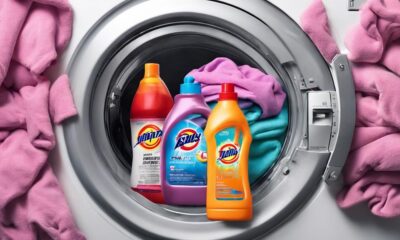
 Vetted3 weeks ago
Vetted3 weeks ago15 Best Sports Laundry Detergents for Keeping Your Activewear Fresh and Clean
-
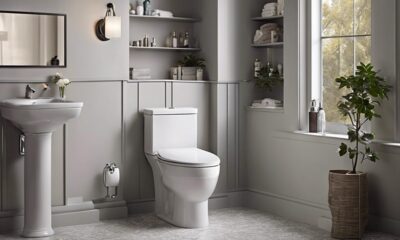
 Vetted3 weeks ago
Vetted3 weeks ago15 Best Tall Toilets for Seniors That Combine Comfort and Safety
-

 Vetted4 weeks ago
Vetted4 weeks ago15 Best Dish Scrubbers to Keep Your Kitchen Sparkling Clean
-
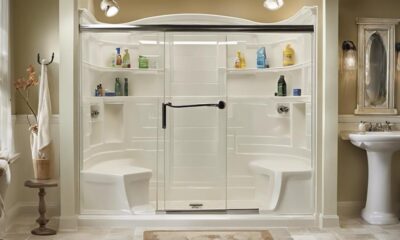
 Vetted22 hours ago
Vetted22 hours ago15 Best Cleaners for Fiberglass Showers to Keep Your Bathroom Sparkling Clean
-

 Decor4 weeks ago
Decor4 weeks agoWhat Is Eclectic Home Decor









